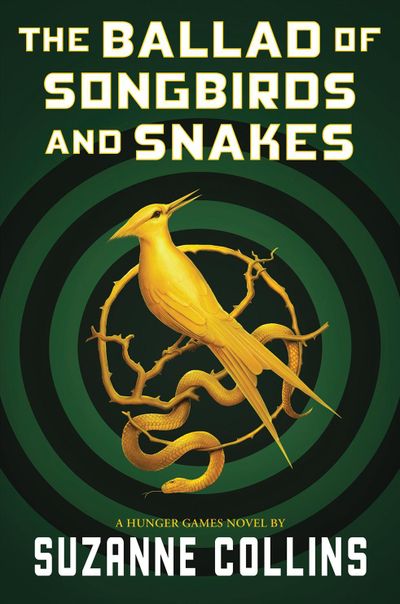In ‘The Ballad of Songbirds and Snakes,’ Suzanne Collins reveals origin of President Snow, Hunger Games

If you know Suzanne Collins’ dystopian Hunger Games trilogy, you know Coriolanus Snow. He’s Katniss Everdeen’s nemesis and the tyrannical president of Panem, where every year 24 kids from the districts are selected to fight to a televised death. He’s a sadist who smells of roses and has a talent for crushing spirits and heartbeats. In short, he keeps the bloodbath going.
Do you need to know more? With the publishing odds ever in her favor (the Hunger Games trilogy has sold more than 100 million copies), Collins believes you do. In her new book, “The Ballad of Songbirds and Snakes,” a prequel to “The Hunger Games,” she looks at the man (OK, the teenager) who became the monster.
To do that, Collins takes readers back 64 years before Katniss competed in the Games to a Capitol that is still rebuilding after the districts’ unsuccessful rebellion. Eighteen-year-old Coriolanus, Coryo to his friends, is a student at the prestigious Academy desperately in need of a financial scholarship. Heavy on lineage but short on food, Coryo is living with his cousin Tigris and his grandmother in a luxury apartment stripped of all luxuries. He is the son of a dead war hero, and his singular goal is to bring glory back to the House of Snow. How to do that? World domination, of course.
That’s a tall order for someone surviving off beans and cabbage, but the Games prove to be a game-changer. It’s been 10 years since their inception, and like any reality show that has been on for a decade, it could use new bells and whistles. It is decided that for the first time, Academy students will mentor the tributes forced to compete. Coriolanus is chosen as a mentor and is already dreaming about steak dinners and purchasing power when he is assigned Lucy Gray Baird, the District 12 girl.
“Could there be a bigger slap in the face?” Coriolanus wonders. “District 12, the smallest district, the joke district, with its stunted, joint-swollen kids that always died in the first five minutes, and not only that … but the girl?” Turns out Coriolanus has no need to panic.
Hunger Games fans know that District 12 was Katniss’ district and that she was anything but stunted. Same can be said of Lucy Gray Baird. Though lacking that killing-machine vibe, she’s a singer with charisma to spare, crooning her way into hearts and making pronouncements such as “I’ve got a song that was made for this whiskey voice.” She’s basically the Stevie Nicks of the Hunger Games, and Coriolanus, who has survived on smiles, knows what a powerful weapon charm can be. For the populace placing bets on the tributes, she is an easy girl to fall in love with – and she is for Coryo, too.
Though we won’t find out the origin of the Games until the end of the book, much of “Songbirds and Snakes” is rooted in the idea that what is past is prologue. Although the Games are inspired by the theatrics and violence of ancient Rome, the TV viewers aren’t materializing. The ratings need a boost, and it’s up to the mentors to increase them. Shall they execute those who don’t watch? Or let viewers feed the tributes as if they were zoo animals? Oh, the possibilities.
The scenes during the Games are sharply plotted and move with the same super-speed readers will remember from the series. But it is the third part of the book, which takes the action to District 12, that is the most revelatory in terms of the gradual chipping away of Coryo’s humanity.
There, even though his head is saying that bohemian musicians and tyranny just do not mix, he is not a cut-and-dried villain yet. Through his emotional interactions with Lucy Baird and his complicated friendship with Sejanus Plinth, scion of a monied munitions magnate with a growing conscience, we see Coryo’s obsession with power waver, his catchphrase “Snow lands on top!” losing its stranglehold. We know it won’t last, but it’s fascinating to see that he once considered crossing off “become future despot” from his to-do list.
One of the delicious qualities of a prequel is that it fills in the blanks. For those who lapped up the trilogy and have been waiting 10 long years for answers – to questions like “Which unhinged savage came up with kids killing kids?” or “What’s the meaning behind the song ‘The Hanging Tree’?” – Collins has them.
As soon as news of the book broke, this was the question: In a series with so many likable characters, why did Collins choose the most sadistic as the protagonist? In the first third of the book, head gamemaker Dr. Gaul reminds her Academy students that “wars are won with heads, not hearts.” It’s the pull between Coryo’s head and heart – and the realization that he actually has a beating heart, not just a rose-scented lump of coal – that makes the future President Snow very worthy of a 517-page prequel.
Tanabe is the author of five books, including, most recently, “A Hundred Suns.”